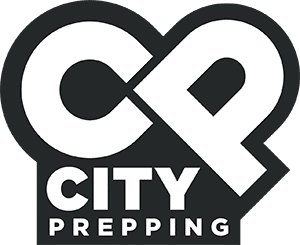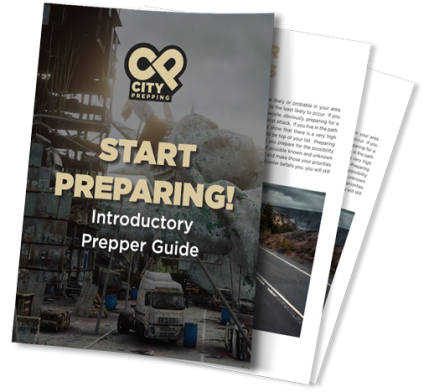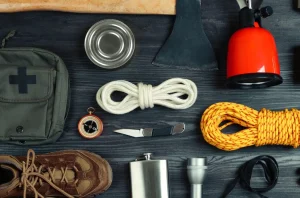 As we covered in the previous video, we’re in what many economists consider the early stages of a recession. It’s increasingly likely that things will get worse financially in the coming year. There are multiple factors putting downward pressure on the markets. The way to endure and emerge stronger from a downward market is by prioritizing your financial situation as one of your preps.
Financially positioning yourself to survive can be challenging during a global recession when your hard-earned dollars buy less, inflation and interest rates increase, and you don’t have much to begin with. If you stockpile food, water, general household supplies, silver, or anything else and don’t have a 3-6 month emergency fund of cash, you are really not thinking for the long-term.
Also, if we are lucky, we will one day be old. How is your retirement fund looking? We are always baffled by the number of people with very few plans for when they are 50 or 60 or more years of age. So, many people are so caught up in the day-to-day that they don’t take time to consider what they will do when a disaster robs them of their possessions, an injury forces them out of work, or some unforeseen circumstance destroys their earning potential. When was the last time you rearranged your 401k plan? Have you set it and forgotten about it? Are you taking advantage of total employer matching contributions? Do you have a tax-free college savings plan for the kids or grandkids? Do you have a living will, or will you pass your debt burdens and a financial mess to your kids to sort out? Are you prepared for when your car breaks down, or your employer suddenly lays you off work?
We are not a financial planner or advisor, but here are six things you can do right now to build a strong foundation for the future. 1) insure your home and possessions against disasters. Review your policies and coverage. If you live in a disaster zone, you absolutely have to figure out a way to ensure your home and possessions. 2) insure yourself with a life insurance and long-term care policy. If something happens to you, you will have peace of mind that your inheritors will have the resources they need to sort it out. 3) trim unused subscriptions and memberships. Plenty of people have entertainment services, other subscriptions, and gym memberships that they haven’t used or have barely used in months. Look at those and eliminate the ones you don’t use enough. If you are going to a gym you pay 19.95 a month just twice per month, you are paying about $10 a visit. 4) buy in bulk and cook for yourself. Have you looked at the price of one meal out these days? Restaurant prices increased by 12% last year, and they will go up from there this next year. 5) save 10%. Whether building an emergency fund by putting money in a coffee can or a savings account, you must try to set aside 10% of your income and not touch it. When you have 3-months or more living expenses set aside, you will be well-positioned to survive most disasters. Shockingly, just $500 as an emergency fund puts you better than 47% of the people in America. 6) Know where it goes. Start by understanding where every dollar goes. Then, build a plan that allows you to save and cut costs where you can even as the economy tanks further.
There’s so much more here, but we encourage you to start with just these 6 for the new year. Implement each in some small way this next year. You can download our FREE Recession-proof Guide for even more information. If you do a little of each, you will face disasters with greater resiliency. I’m not saying that money will be the solution to everything that can happen, but it sure does fix many things. Get your finances in order before you worry about prepping for more remote possibilities.
As we covered in the previous video, we’re in what many economists consider the early stages of a recession. It’s increasingly likely that things will get worse financially in the coming year. There are multiple factors putting downward pressure on the markets. The way to endure and emerge stronger from a downward market is by prioritizing your financial situation as one of your preps.
Financially positioning yourself to survive can be challenging during a global recession when your hard-earned dollars buy less, inflation and interest rates increase, and you don’t have much to begin with. If you stockpile food, water, general household supplies, silver, or anything else and don’t have a 3-6 month emergency fund of cash, you are really not thinking for the long-term.
Also, if we are lucky, we will one day be old. How is your retirement fund looking? We are always baffled by the number of people with very few plans for when they are 50 or 60 or more years of age. So, many people are so caught up in the day-to-day that they don’t take time to consider what they will do when a disaster robs them of their possessions, an injury forces them out of work, or some unforeseen circumstance destroys their earning potential. When was the last time you rearranged your 401k plan? Have you set it and forgotten about it? Are you taking advantage of total employer matching contributions? Do you have a tax-free college savings plan for the kids or grandkids? Do you have a living will, or will you pass your debt burdens and a financial mess to your kids to sort out? Are you prepared for when your car breaks down, or your employer suddenly lays you off work?
We are not a financial planner or advisor, but here are six things you can do right now to build a strong foundation for the future. 1) insure your home and possessions against disasters. Review your policies and coverage. If you live in a disaster zone, you absolutely have to figure out a way to ensure your home and possessions. 2) insure yourself with a life insurance and long-term care policy. If something happens to you, you will have peace of mind that your inheritors will have the resources they need to sort it out. 3) trim unused subscriptions and memberships. Plenty of people have entertainment services, other subscriptions, and gym memberships that they haven’t used or have barely used in months. Look at those and eliminate the ones you don’t use enough. If you are going to a gym you pay 19.95 a month just twice per month, you are paying about $10 a visit. 4) buy in bulk and cook for yourself. Have you looked at the price of one meal out these days? Restaurant prices increased by 12% last year, and they will go up from there this next year. 5) save 10%. Whether building an emergency fund by putting money in a coffee can or a savings account, you must try to set aside 10% of your income and not touch it. When you have 3-months or more living expenses set aside, you will be well-positioned to survive most disasters. Shockingly, just $500 as an emergency fund puts you better than 47% of the people in America. 6) Know where it goes. Start by understanding where every dollar goes. Then, build a plan that allows you to save and cut costs where you can even as the economy tanks further.
There’s so much more here, but we encourage you to start with just these 6 for the new year. Implement each in some small way this next year. You can download our FREE Recession-proof Guide for even more information. If you do a little of each, you will face disasters with greater resiliency. I’m not saying that money will be the solution to everything that can happen, but it sure does fix many things. Get your finances in order before you worry about prepping for more remote possibilities.
Grow your own food
 We have covered the challenges facing agricultural production in several videos this year. The supply chain remains frazzled. A big war and lockdowns are already straining low agricultural output, and crops suffer from extreme weather and expensive fertilizer worldwide. We cannot stress enough how this will impact our food supply. It will only result in higher prices and diminished variety if you’re lucky. Some countries will face shortages and even famine. It will get far worse this next year.
Your food preps are like a tank of gas. When they are all used up, you can’t go any further. This next year you must start to grow something, anything, to supplement your food supply. A hermetically sealed canister of seeds might help you rebuild after a societal collapse, but increasing your current food supply is more practical. Gardening isn’t something you can just pick up overnight, and many of us aren’t blessed with large yards or green spaces where we can grow enough food to sustain ourselves solely.
Recognizing this, we started a series on the channel specific to growing your own food in small areas that we’ll be focusing on over the next few months. We are taking a ground-up approach, beginning with the basics, building what we need over the next few winter months, and planning a full deployment in spring. You should check that out with the first video in the series and grow with us this next year. It will enhance your food security in the present, future, and especially after any disaster. We always recommend starting with a solid food supply, but learning to grow your own food is a critical and necessary step. Even if it is a small garden, the key is to develop this skill, as it will be a crucial skill for you in the future.
We have covered the challenges facing agricultural production in several videos this year. The supply chain remains frazzled. A big war and lockdowns are already straining low agricultural output, and crops suffer from extreme weather and expensive fertilizer worldwide. We cannot stress enough how this will impact our food supply. It will only result in higher prices and diminished variety if you’re lucky. Some countries will face shortages and even famine. It will get far worse this next year.
Your food preps are like a tank of gas. When they are all used up, you can’t go any further. This next year you must start to grow something, anything, to supplement your food supply. A hermetically sealed canister of seeds might help you rebuild after a societal collapse, but increasing your current food supply is more practical. Gardening isn’t something you can just pick up overnight, and many of us aren’t blessed with large yards or green spaces where we can grow enough food to sustain ourselves solely.
Recognizing this, we started a series on the channel specific to growing your own food in small areas that we’ll be focusing on over the next few months. We are taking a ground-up approach, beginning with the basics, building what we need over the next few winter months, and planning a full deployment in spring. You should check that out with the first video in the series and grow with us this next year. It will enhance your food security in the present, future, and especially after any disaster. We always recommend starting with a solid food supply, but learning to grow your own food is a critical and necessary step. Even if it is a small garden, the key is to develop this skill, as it will be a crucial skill for you in the future.
Physical Health
 If you haven’t got your health, you haven’t got anything. When your car won’t run or there’s no gas coming to your area, will you be able to walk the 5, 10, or 20 or more miles home from work? Could you lift yourself over a 6-foot wall? Will you be successful in the high-stress and strained environment of the aftermath of a disaster?
Time will tell, but you should be doing what you can to prioritize your physical health. Even job loss or separation stress can raise our cortisol levels and throw our biological systems into craziness—the risk of stroke and sleep deprivation skyrocket in the wake of these. The solution is to build your physical health almost every day. You need to find “a” plan that works for you. For some, that may be as simple as passing on a night of Netflix and walking Fido after work. For others, it might mean a commitment to hiking, bicycling, or gardening. Find a plan that can work for you, and then make it work for you.
It’s easy to say, “I want to get in shape,” or “I want to lose weight.” When we did our marathon last year, we found a plan online. It gave us a clear path to prepare for our marathon. If you’re interested in weight lifting, we enjoy the work plans at Bodybuilding.com: BodyFit: The Ultimate Fitness Solution | Bodybuilding.com. We have no affiliation with them. We are only recommending it as it’s a solution we use. We like their app, which we can use at the gym to track my lifting. For cardio, we enjoy the Apple fitness app. While you can exercise with plenty of videos on YouTube (yoga, TaiChi, treadmills, and more), we like the feeling of having a trainer pushing me in the app and being able to keep track of the calories burned and heart rate through the watch. While these have a cost, we view them from the perspective of prioritizing my health and the value there.
Our video How to Physically Prepare for SHTF: Functional Fitness and Nutrition is a good starting point for further exploration of this. There’s plenty in there for you to build off of, but you have to be more physically ready to face the challenges this next year because the challenges will be more significant.
If you haven’t got your health, you haven’t got anything. When your car won’t run or there’s no gas coming to your area, will you be able to walk the 5, 10, or 20 or more miles home from work? Could you lift yourself over a 6-foot wall? Will you be successful in the high-stress and strained environment of the aftermath of a disaster?
Time will tell, but you should be doing what you can to prioritize your physical health. Even job loss or separation stress can raise our cortisol levels and throw our biological systems into craziness—the risk of stroke and sleep deprivation skyrocket in the wake of these. The solution is to build your physical health almost every day. You need to find “a” plan that works for you. For some, that may be as simple as passing on a night of Netflix and walking Fido after work. For others, it might mean a commitment to hiking, bicycling, or gardening. Find a plan that can work for you, and then make it work for you.
It’s easy to say, “I want to get in shape,” or “I want to lose weight.” When we did our marathon last year, we found a plan online. It gave us a clear path to prepare for our marathon. If you’re interested in weight lifting, we enjoy the work plans at Bodybuilding.com: BodyFit: The Ultimate Fitness Solution | Bodybuilding.com. We have no affiliation with them. We are only recommending it as it’s a solution we use. We like their app, which we can use at the gym to track my lifting. For cardio, we enjoy the Apple fitness app. While you can exercise with plenty of videos on YouTube (yoga, TaiChi, treadmills, and more), we like the feeling of having a trainer pushing me in the app and being able to keep track of the calories burned and heart rate through the watch. While these have a cost, we view them from the perspective of prioritizing my health and the value there.
Our video How to Physically Prepare for SHTF: Functional Fitness and Nutrition is a good starting point for further exploration of this. There’s plenty in there for you to build off of, but you have to be more physically ready to face the challenges this next year because the challenges will be more significant.
Mental Health
 This is probably the best point to segue into addressing your mental health, as your physical health enhances it. So far, this decade has been nothing short of a crazy-making stress bomb, and many out there are pushing the craziness further. Politics are divisive and leave neighbors turning on neighbors. Algorithms on social media try to get our juices flowing and feed us a one-sided narrative designed to excite, anger, and get a rise out of us. The power goes out, our gas station runs out of gas, or our stores no longer have the food we need.
The modern world seems designed to make us frantic and crazy and then sell us a calming solution. The disasters we will face next year, the rising cost of everything, and the long hours put in with our currency buying less and less, will all be a crazy-making recipe. The very act of prepping also acknowledges that things may get far worse tomorrow than they are today. There’s anxiety and stress in knowing that you are readying yourself for darker days tomorrow. That’s why you will hear on this channel that you must take continual steps to secure your mental health and stability. You must avoid the high-cortisol-releasing confrontations when you need to and focus on your inner calmness.
We released a video about this called 6 Things You Must Do NOW to Mentally Prepare For What’s Coming Next, which is an excellent foundation for you to build upon. There are many challenges on the horizon. We’ve read recently about the explosion of depression and other mental health issues that have come from the events of the last several years. If you feel overwhelmed right now, you need to do something about that. Find helping resources, build your community, and network. Strengthen your connections to the things that keep you grounded and stable.
At the bare minimum, confide your anxiety-laden concerns with someone you trust. It’s ok if you have to take time off from social media, the news, or preparedness videos. If you feel overwhelmed, take a step back from it all. Trust me, it will all be here when you return to it.
Actionable Goals
This is probably the best point to segue into addressing your mental health, as your physical health enhances it. So far, this decade has been nothing short of a crazy-making stress bomb, and many out there are pushing the craziness further. Politics are divisive and leave neighbors turning on neighbors. Algorithms on social media try to get our juices flowing and feed us a one-sided narrative designed to excite, anger, and get a rise out of us. The power goes out, our gas station runs out of gas, or our stores no longer have the food we need.
The modern world seems designed to make us frantic and crazy and then sell us a calming solution. The disasters we will face next year, the rising cost of everything, and the long hours put in with our currency buying less and less, will all be a crazy-making recipe. The very act of prepping also acknowledges that things may get far worse tomorrow than they are today. There’s anxiety and stress in knowing that you are readying yourself for darker days tomorrow. That’s why you will hear on this channel that you must take continual steps to secure your mental health and stability. You must avoid the high-cortisol-releasing confrontations when you need to and focus on your inner calmness.
We released a video about this called 6 Things You Must Do NOW to Mentally Prepare For What’s Coming Next, which is an excellent foundation for you to build upon. There are many challenges on the horizon. We’ve read recently about the explosion of depression and other mental health issues that have come from the events of the last several years. If you feel overwhelmed right now, you need to do something about that. Find helping resources, build your community, and network. Strengthen your connections to the things that keep you grounded and stable.
At the bare minimum, confide your anxiety-laden concerns with someone you trust. It’s ok if you have to take time off from social media, the news, or preparedness videos. If you feel overwhelmed, take a step back from it all. Trust me, it will all be here when you return to it.
Actionable Goals
 Finally, we encourage you to set realistic, attainable goals. Go ahead and make them ambitious but not outlandish. You may want to grow 10 pounds of your own food, or a 100. Maybe you’d like to be able to walk 1,5 or 10 miles. Perhaps you’d like just to be able to save 10% of your income for emergency use. Personally, we dream big, and we constantly have to pull ourselves back to today. We have to force ourselves to understand that tomorrow’s possibilities are seeded with today’s actions.
Ask yourself how you want to be positioned in the future and then go, “yeah, okay, but how do we start working towards that today?” If there’s a skill or goal you want to achieve, find a plan that clearly lays it out. For example, don’t just say you want a year’s food supply, but find a plan explaining how to achieve this. We outlined how you can do just that for pennies per day in an earlier video called How to Build 1 Year of Food Storage – Ultimate Guide. With how much greater confidence and peace of mind will you face the challenges of this next year if you know you have food to eat despite what the world throws at you?
Convert your prepping goals into actionable plans. Instead of saying, “I want to have enough water stored for three weeks for my family,” say, “In order to have enough water for three weeks for my family of 4, I will need a minimum of 4 gallons per day for 21 days which means I need 84 gallons of water. How will I store 84 gallons of water? I can buy a 55-gallon barrel which I can stick in my garage and then get six 5-gallon water containers. I will sit down and calculate these costs and then set aside an amount of money each month to save up and purchase these.” Instead of defining a lofty goal, determine the steps it will take to achieve that goal. It’s that simple. I’ll link to a great introduction water storage guide you can reference here: 8 Best Water Storage Options for Emergencies.
If you just turn your food and water requirements into actionable goals this next year, you will conquer most disasters that can occur and will emerge stronger.
Conclusion
These five items you can act upon today may seem simple to some and impossible to others. We are all at different stages of readiness. We face different threats and disasters depending upon our situation in life and our geography. And some threats are global and will impact all of us in some way. You can do something today to fortify your tomorrow.
Whether that is prepping your finances, food, water, mental and physical health, or growing your own food to free yourself from dependence on supply chains that will fail us all, commit to doing something today. Storms will come. Political unrest will continue. Wars will continue. Inflation will continue. The list goes on and on without end. Accepting this can ratchet up our stress and affect our health and well-being, but you maintain control through prepping. Remember the words of the Roman philosopher Musonius Rufus, “We must concern ourselves absolutely with the things that are under our control and entrust the things not in our control to the universe.” I have to agree. Make a plan and work a plan to make the problems of next year less consequential to you.
As always, stay safe out there.
Finally, we encourage you to set realistic, attainable goals. Go ahead and make them ambitious but not outlandish. You may want to grow 10 pounds of your own food, or a 100. Maybe you’d like to be able to walk 1,5 or 10 miles. Perhaps you’d like just to be able to save 10% of your income for emergency use. Personally, we dream big, and we constantly have to pull ourselves back to today. We have to force ourselves to understand that tomorrow’s possibilities are seeded with today’s actions.
Ask yourself how you want to be positioned in the future and then go, “yeah, okay, but how do we start working towards that today?” If there’s a skill or goal you want to achieve, find a plan that clearly lays it out. For example, don’t just say you want a year’s food supply, but find a plan explaining how to achieve this. We outlined how you can do just that for pennies per day in an earlier video called How to Build 1 Year of Food Storage – Ultimate Guide. With how much greater confidence and peace of mind will you face the challenges of this next year if you know you have food to eat despite what the world throws at you?
Convert your prepping goals into actionable plans. Instead of saying, “I want to have enough water stored for three weeks for my family,” say, “In order to have enough water for three weeks for my family of 4, I will need a minimum of 4 gallons per day for 21 days which means I need 84 gallons of water. How will I store 84 gallons of water? I can buy a 55-gallon barrel which I can stick in my garage and then get six 5-gallon water containers. I will sit down and calculate these costs and then set aside an amount of money each month to save up and purchase these.” Instead of defining a lofty goal, determine the steps it will take to achieve that goal. It’s that simple. I’ll link to a great introduction water storage guide you can reference here: 8 Best Water Storage Options for Emergencies.
If you just turn your food and water requirements into actionable goals this next year, you will conquer most disasters that can occur and will emerge stronger.
Conclusion
These five items you can act upon today may seem simple to some and impossible to others. We are all at different stages of readiness. We face different threats and disasters depending upon our situation in life and our geography. And some threats are global and will impact all of us in some way. You can do something today to fortify your tomorrow.
Whether that is prepping your finances, food, water, mental and physical health, or growing your own food to free yourself from dependence on supply chains that will fail us all, commit to doing something today. Storms will come. Political unrest will continue. Wars will continue. Inflation will continue. The list goes on and on without end. Accepting this can ratchet up our stress and affect our health and well-being, but you maintain control through prepping. Remember the words of the Roman philosopher Musonius Rufus, “We must concern ourselves absolutely with the things that are under our control and entrust the things not in our control to the universe.” I have to agree. Make a plan and work a plan to make the problems of next year less consequential to you.
As always, stay safe out there. 





